Review: The Mimicking of Known Successes, by Malka Older
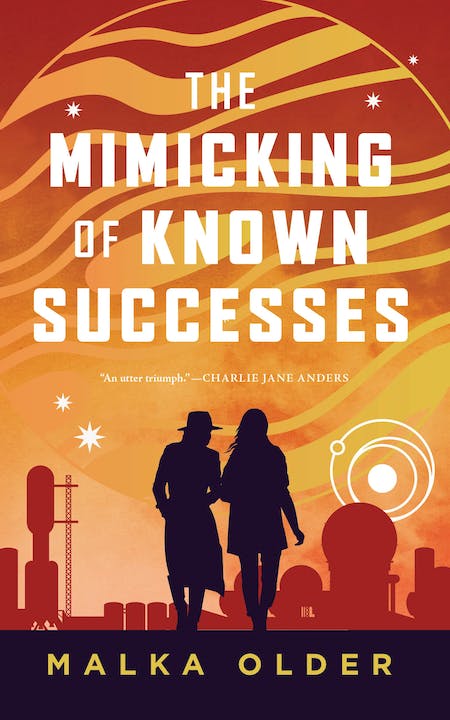
Malka Older’s The Mimicking of Known Successes is a lovely cozy mystery and sapphic romance in a tonally nearish-future SF setting. If, like me, you struggled a bit with author Malka Older’s Centenal Cycle trilogy (I admit I haven’t made it past the first book, Infomocracy), please consider giving this novella a try. It was one of my favorite things to read this year. One of the reasons I had stumbled during Infomocracy was the multiple characters and POVs – sometimes I’m good with that, but I started reading it in 2019, not a great year for me to be challenging myself during leisure time. But TMoKS starts with a tight-focus third-person narrative focused on Mossa, a professional detective, and switches to a first-person narrative from Pleiti, a scholar, so it’s a lot easier to track what’s happening (although intentions and motivations aren’t revealed for quite a while). Also helping with the ease of reading is that although this is science fiction, the tone feels like gaslamp Victorian/Edwardian-style fiction, minus the racism and sexism (there’s still some degree of classism, though, at least with some characters being arrogant about their academic status). Humanity has moved to Jupiter after wrecking the Earth’s environment, with a series of platforms in the upper atmosphere of the gas giant that are connected via a rail system. So as Mossa and Pleiti follow leads from platform to platform, it reminds me a lot of various Sherlock Holmes mysteries where he and Dr. Watson move about tEngland via rail. Also, Pleiti’s university quarters provide tea and scones by the fireside as a welcome warm-up for the pair in Chapter 1, so the mystery is literally cozy. It is also pretty hot in places! Mossa and Pleiti are ex-flames from college, who had a bad breakup. The two have very different interests, competencies, and personalities, but the heat is still there; at least we see that on Pleiti’s side before too long. And when one of them is injured, the other helps bathe the wound clean and has to struggle to keep her mind, emotions and voice under control… Fortunately, frustrations are eventually resolved satisfyingly – but I definitely want to see this relationship continue to progress in future stories. As for the mystery, I love how it spins up step by step (with a few twists and turns along the way) from a missing person to a case with much broader implications. Some SF mysteries are basically just present-day puzzles with a technological gloss, but the futuristic setting here is integral to the mystery and to people’s motivations, and the complex details of the worldbuilding (from simple elements like an atmoscarf that helps one breathe outside, to vital plot-spoilery ones) really immerse the reader into the story. Incidentally, the title comes from humans on Jupiter trying to figure out how to recreate Earth’s environment – Pleiti’s Classics discipline actually centers not so much on interpreting literature as on using literature to infer whole working ecologies, such as cataloging plant life in (implied) Watership Down. It’s certainly not cozy to imagine the devastated Earth, but I’ve been reading some other “cozy catastrophes” lately, where the coziness lies in survivors starting small and building futures together, and this fits that description. Older has said that she set out to write a comfort read, and I believe she succeeded masterfully. Worldbuilding, mystery, characters and romance combine delightfully in this novella. I eagerly await the sequel in February 2024, and, fortified by this lovely story, I may even return to the Centenary Cycle. The Mimicking of Known Successes, available here from Barnes & Noble, has a sort of subtitle these days: “The Investigations of Mossa and Pleiti Book 1.” Yes, that means there is a follow-up coming! The Imposition of Unnecessary Obstacles is available now for preorder. I am definitely looking forward to reading that! Content warnings: Violence, death, past background environmental catastrophe, sexy scenes (not graphic). Comparisons: C.L. Polk’s Even Though I Knew the End (noirish f/f romance-fantasy-mystery), Everina Maxwell’s Winter’s Orbit (mostly cozy m/m romance-SF with some mystery), P. Djeli Clark’s A Master of Djinn (steampunk-mystery with f/f romance). Disclaimers: I received a free ARC of this novella from NetGalley. IIRC, I may have had a few very brief exchanges with Older on social media.
Movie Review: THEY CLONED TYRONE (2023) Directed by Juel Taylor
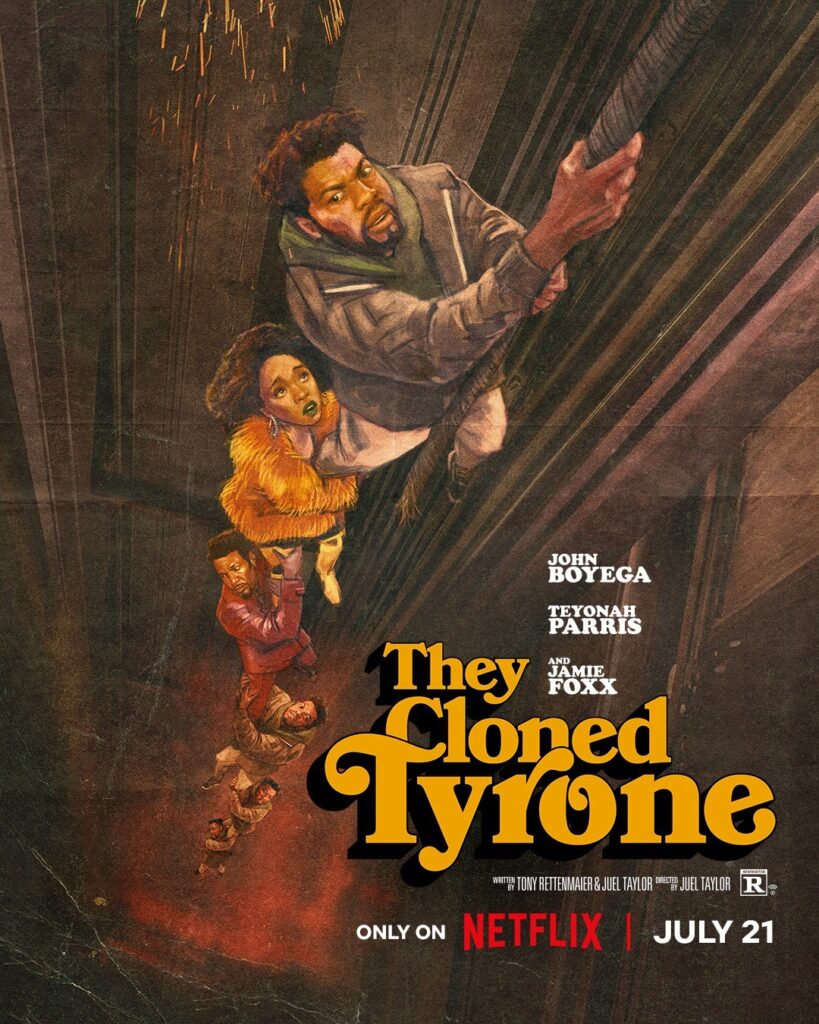
The They Cloned Tyrone movie has earned critical and general audience acclaim in a little over a month since, and Skiffy & Fanty followers with access to Netflix should check it out if they haven’t already.
Book Review: A Study in Honor by Claire O’Dell
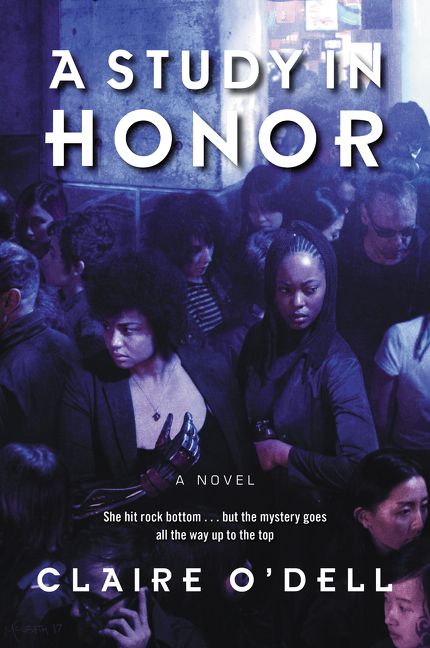
An Americanized retelling of the classic Sherlock Holmes story, set in a future with advanced tech, disastrous civil war, and a diverse main cast, A Study in Honor creates a unique drama that twists the original overdone story into something new. With the leading characters transformed by sex and skin color, O’Dell puts a spin on your typical Sherlock and Watson partnership, and pulls you into a world of intrigue. Dr. Janet Watson is fresh off the front lines of war, with a clumsy mechanical prosthesis that is too big for the delicate surgeon work she does best. With few prospects, and only one friend in D.C., Watson must make the best of a difficult situation. She gets a job, starts therapy, finds a flat and an accompanying flatmate—Sara Holmes, who is secretive, attractive, and, most of all, maddening. Just when everything has seemingly settled, one of Watson’s patients dies suddenly, and then her friend, another doctor on the front lines, dies as well. This sends Watson and Holmes on the path of a secret investigation, a military mission gone horribly wrong, and several more mysterious deaths. But what awaits them on the other end of their investigation could get them both killed if they’re not careful.
Book Review: BLOOD ORBIT by K.R. Richardson
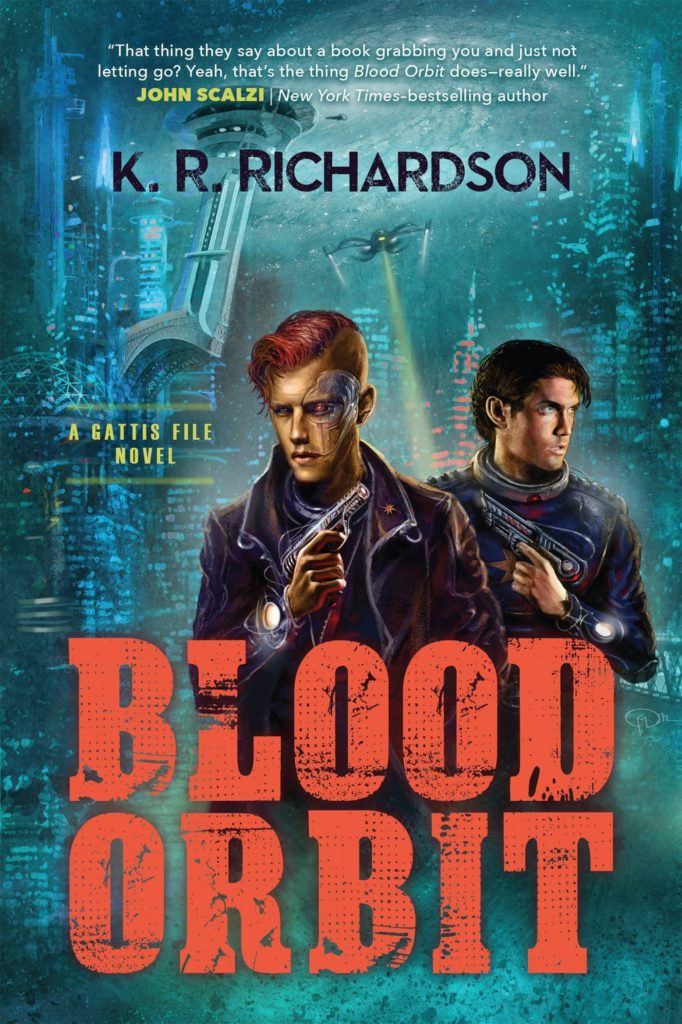
I don’t recall exactly what drew me to picking Blood Orbit out of the many options for potential reviewing here. Likely it was a combination of good experience/trust in the publisher and the description of a crime noir/science fiction blend, a combo of two of my beloved genres. I certainly didn’t recognize the name of the author, and upon finally beginning the novel I had no memory of what that blurb said it was even about. I started reading the electronic copy Pyr had provided expecting a typical slow start. Without the ease of a physical copy I find getting into a novel really challenging while trying to ‘turn’ back to firmly get characters or the seeds of plot to stick in mind. Instead I found little need for that, and my finger tapped through pages in a focused rush to read more. Blood Orbit is exceptionally crafted from its opening, and at no point through its last page did I ever end up feeling like it faltered. Happening to be at Barnes & Noble at the time, I soon decided to get up and just get the actual book, because I already had a feeling this “Gattis File” debut would be one series I’d want to keep up with.
Book Review: The Green Man’s Heir by Juliet McKenna
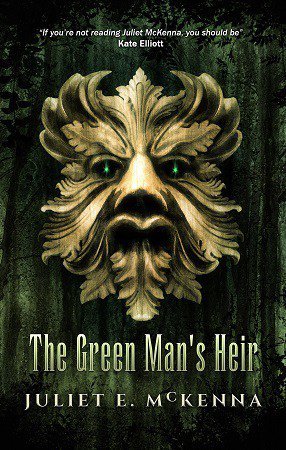
The story of Daniel Mackmain, son of a Dryad, inspired by Juliet McKenna’s 2012 story “The Roots of Aston Quercus”, is told in her new novel, The Green Man’s Heir. The Green Man’s Heir combines a strong sense of place with a confident use of rural fantasy to create a strong character and excellent worldbuilding.
A Book By Its Cover: Autonomous by Annalee Newitz
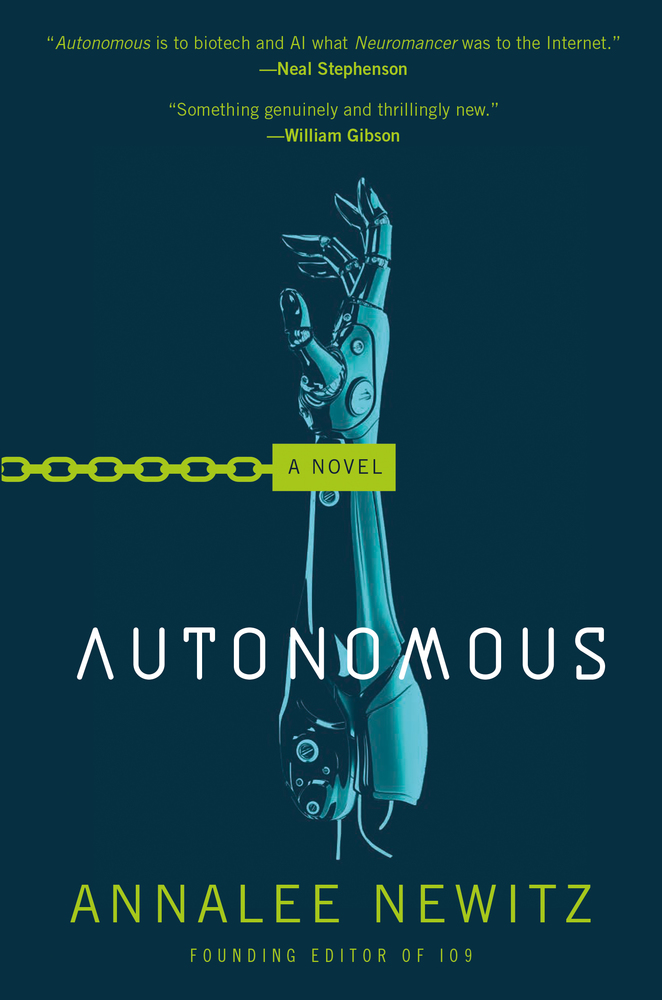
From Karel Čapek’s R.U.R. to Daniel H. Wilson’s Robopocalypse to Matt “Grim-Dark” Groening’s upcoming Futurama X-Treme, the standard script for science fiction featuring artificial intelligence (AI) has been machine rising up against humanity. This theme reached its artistic pinnacle in 1953 with the widely acclaimed masterpiece Robot Monster from noted auteur Phil Tucker, a cinematic disciple of Bresson and Ozu. The plot should be as obsolete as MS-DOS 4.0. Yet, authors and Hollywood writers all keep going back to the robot production factory for ideas. The fear inherent in this fiction has historically accompanied each technological development; with each increase in technology’s power and reach, so goes the fear. Recently, both Stephen Hawking and Elon Musk voiced concerns and warnings regarding AI. Yes, it is true that Hawking and Musk are both usually known for lunatic ramblings, but their warning here does seem logical and warranted.

